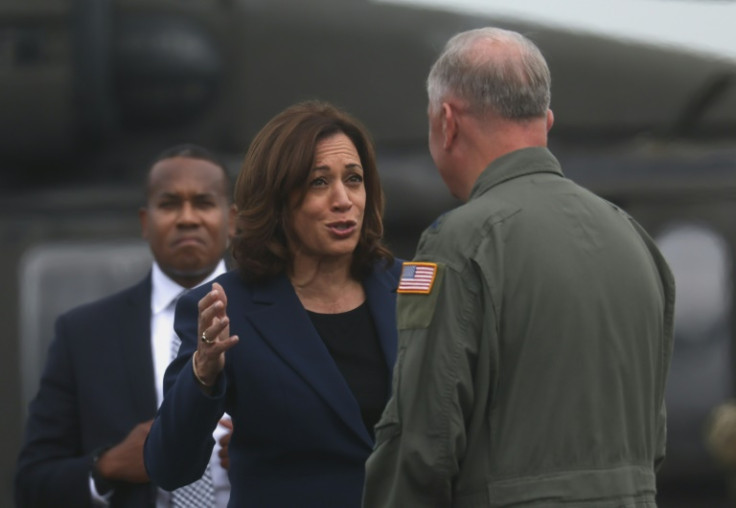US VP Harris Lands In S. Korea After North's Missile Tests

US Vice President Kamala Harris was in South Korea Thursday to tour the heavily fortified border with the nuclear-armed North, on a trip aimed at strengthening the security alliance with Seoul.
Pyongyang conducted two banned ballistic missile launches in the days before Harris's arrival, part of a record-breaking streak of weapons tests this year.
Speaking ahead of her meeting with South Korea's President Yoon Suk-yeol, Harris said the countries' alliance was "a linchpin of security and prosperity on the Korean peninsula".
"I'm here to reinforce the strength of our alliance and strengthen our work together," she added.
Washington stations about 28,500 troops in South Korea to help protect it from the North, and the allies are conducting a large-scale joint naval exercise this week in a show of force against the North.
Harris' trip to the Demilitarized Zone (DMZ) is likely to infuriate Pyongyang, which branded United States House Speaker Nancy Pelosi the "worst destroyer of international peace" when she visited the border in August.
Harris arrived in Seoul after a trip to Japan, where she attended the state funeral of assassinated former prime minister Shinzo Abe, before telling US troops that America would operate "undaunted and unafraid" throughout Asia, including the Taiwan Strait.
Security issues were set to dominate her meeting with Yoon, although Seoul also planned to raise its concerns over a new law signed by US President Joe Biden that removes subsidies for electric cars built outside America, impacting Korean automakers such as Hyundai and Kia.
Harris, America's first woman vice president, will also meet what the White House called "groundbreaking women leaders" of South Korea to discuss gender equality issues.
Yoon, who has pledged to abolish Seoul's Ministry of Gender Equality, has faced domestic criticism for a lack of women in his cabinet.
Harris lands in Seoul after months of warnings from South Korean and US officials that North Korean leader Kim Jong Un is preparing to conduct another nuclear test.
On Wednesday, the South's spy agency said the test could happen next month.
The isolated regime has tested nuclear weapons six times since 2006. Its last and most powerful one in 2017 -- which Pyongyang claimed was a hydrogen bomb -- had an estimated yield of 250 kilotons.
"North Korea's growing nuclear missile threat raises concerns in Seoul about the reliability of Washington's defense commitments," said Leif-Eric Easley, a professor at Ewha University in Seoul.
But sending both the USS Ronald Reagan supercarrier and Kamala Harris is a demonstration of America's military capabilities and political will, he added.
During President Yoon's tenure, Seoul and Washington have boosted joint military exercises, which they insist are purely defensive. North Korea sees them as rehearsals for an invasion.
Cheong Seong-chang of the Center for North Korean Studies at the Sejong Institute told AFP that he expected Yoon and Harris to discuss the plan for responding to another nuclear test by Pyongyang.
Harris's trip is "an opportunity to strengthen the high-level cooperative and friendly relationship between South Korea and the United States", he said.
On Thursday, Seoul said it would hold trilateral anti-submarine drills with Japan and the US, the first such exercises since 2017, after officials said this weekend they had detected signs Pyongyang could be preparing to fire a submarine-launched ballistic missile.
© Copyright AFP 2024. All rights reserved.





















